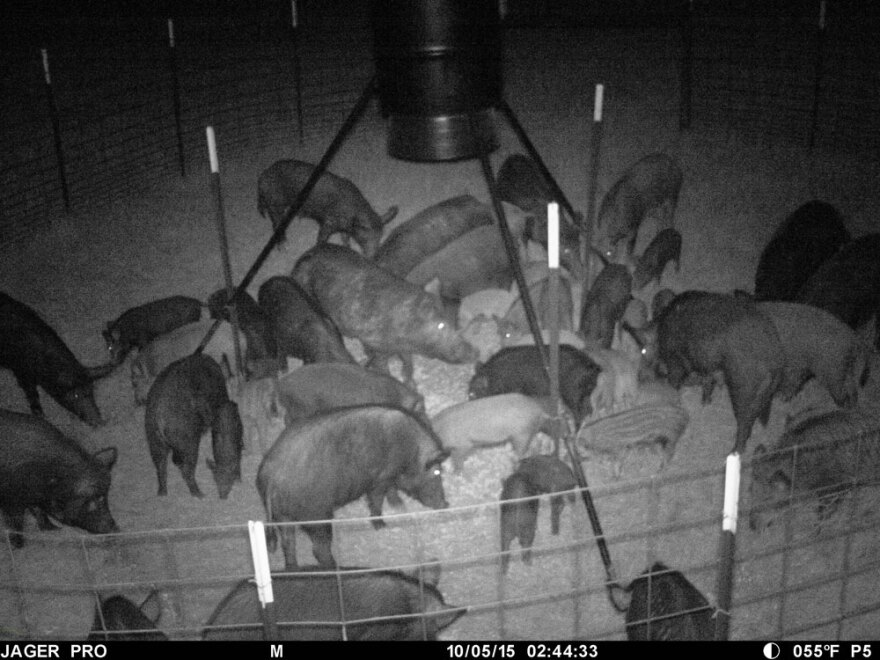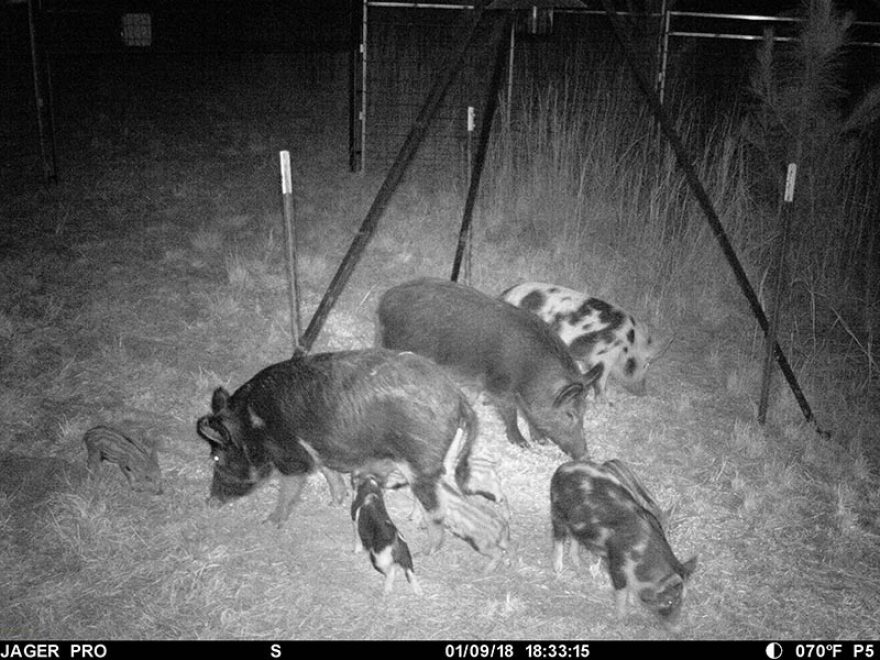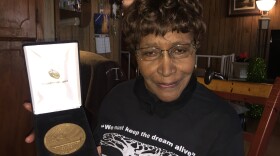Twenty little piggies won’t be going to market. They were caught by a remotely-controlled trapping system designed to capture entire social units of feral swine.
“Somebody asked me, 'Well Rod, you don’t really want to kill all the pigs, because that would be a horrible business plan,' and I said, 'Bullshit. If I could kill the last damn pig in the United States, I would happily do that and go retire,'" said Rod Pinkston, the CEO of Jager Pro, a Georgia-based company that develops and sells hog traps.
Jager Pro removes an estimated 300,000 unwanted pigs from properties across the United States each year, and Alabama keeps him especially busy.
Pinkston has met people who want to protect hogs, and he’s not one of them.
“When I start talking about a feral pig being a four-legged economic terrorist, and we need to kill every single one of them, we aren’t speaking the same language,” he said.
Bence Carter is regional extension agent for the Alabama Cooperative Extension System, or ACES for short. He researches forestry and wildlife issues, and helps to educate Alabama farmers on best practices.

“When you look at nationwide, agricultural impacts exceed 2 billion, but even those numbers are quite a few years old, so we expect those to be increased,” he said.
And according to ACES, feral swine are responsible for around $55 million a year in agriculture damage in Alabama alone. Carter said that some of Alabama’s most popular cash crops are affected by wild pigs.
“Peanuts are heavily impacted by wild pigs. Corn production is impacted by wild pigs, and even cotton production to a certain extent," he said. “It’s often described of pig’s rootings that look like a bomb went off in a hayfield.”
Chris Weaver manages a hemp farm in Bibb County, Alabama. Earlier this year, he started to see traces of feral hogs on the edges of his land.
“I’ve seen some signs down on the creek on my side of the property, but nowhere like in the interior of the property,” he said.
Just the signs of wild hogs was enough to motivate Weaver to invest in preventative measures to protect his crop. Step one was an 8-foot-high-fence around his entire hemp field. Weaver knows the pigs are coming, and he can only do so much.
“The 8-foot fence we actually only put around our help field which is 25 acres. And that was mainly looking forward ahead to when the hogs do fully move in, that way we can keep them out,” Weaver said.
For Weaver and other farmers alike, hog-defense can get expensive. Weaver said that it cost him over $24,000 to surround his hemp field with fencing. That may sound pricey, but it cost Weaver $12,000 an acre to plant his crop.
“I looked at it like this. It would be terrible if I didn’t have any kind of preventive measure to keep them out of the field and they got in it and destroyed an acre or two of hemp," he said. "It’s not cheap to get into hemp so that would be pretty costly.”

Barry Estes is the co-founder of Alabama Hog Control, a central-Alabama company that specializes in killing and trapping hogs. Estes said that crop destruction caused by hogs can hit a farmer hard in the wallet.
“I mean, they’ll devastate a cornfield, tens of thousands of dollars in damage," he said. "That shows up at home on the dinner table at home for everybody.”
Nationwide, feral hogs are responsible for around $2 billion a year in agricultural damage.
Estes has been catching and killing hogs for over a decade. He said throughout his career, he’s watched the problem with feral pigs only get worse.
“There’s just so many people that aren’t doing anything. As a whole, they continue to seem like they’re spreading and populations increasing,” he said.
Feral hogs aren’t native to the United States. Historians blame Hernando Desoto. The hogs currently chewing on crops in Alabama were introduced by 16th century Spanish explorers who wanted an additional source of food as settlers moved in.
The settlements didn’t last, but the pigs did.
Today, invasive feral hogs are found in over 35 states. Their population boom across Alabama has been just as dramatic. The USDA says wild pigs were found in just 25 counties in Alabama back in 1982. But by 2019, they were statewide.
“It’s just really well known of how prolific their reproductive potential is,” Carter said. “What you can see is that there’s a constant feeding of new individuals into a population, or new pigs into a population.”
Research from Texas A&M University showed that a population of feral hogs can double every four months. A hog population can go from one pig per square mile to 100 in just three years.
Carter also said that hogs will eat almost anything.
“It’s a major issue. Pigs are what we call an ultimate opportunistic omnivore, so there isn’t really much they do not eat," he said. "What we are really concerned about, and really it’s a hard way to be able to quantify, is the impact to our native ecosystems.”
And dinnertime for hogs isn’t limited to agricultural crops.

Carter said that amphibians, birds, wild turkeys, and even white-tailed deer are on the pigs’ menu as well. You might think that hunters in Alabama might help eliminate some of the state’s hog problem. Carter said they can make matters worse.
“You also see an issue with the illegal trap and transport of pigs. So, actually people catching them, and moving them into areas where they have never been. And a lot of that is being driven by the hunting industry,” he said.
The situation got so bad that Alabama outlawed transporting live hogs in 1997. Killing pigs in another matter. The state has relaxed laws on hog-hunting. There’s now no limit on how many hogs a hunter can kill, and they can work year-round. And earlier this year the Alabama conservation commission expanded pig hunts so that they can go on all night.
But experts agree that hunting isn’t the best population control solution. Estes said that trapping is more efficient than hunting in capturing large numbers of hogs with fewer manned hours.
“You can go out and set up a trap in 45 minutes and you may catch 30 pigs in a couple days," he said, "whereas if you stayed out there with a gun all night or all day trying to shoot them, you’d be lucky to get three or four.”
Using money from the 2018 farm bill, the Alabama Soil and Water Conservation Committee launched a three-year program back in April to address Alabama’s hog problem. The Alabama Feral Swine Control Program partners with landowners to actively trap and remove as many pigs as possible, with Washington paying for up to 70% of the cost of new traps. Alabama is the only state that has created its own cost-share program for hog control equipment.
Pinkston said that even with help from government programs, pigs are still going to provide a major challenge.
“You’re dealing with the fourth most intelligent animal on the planet," he said. "Often times, pigs have a better will to survive than the human that is trying to be able to get rid of them.”


































